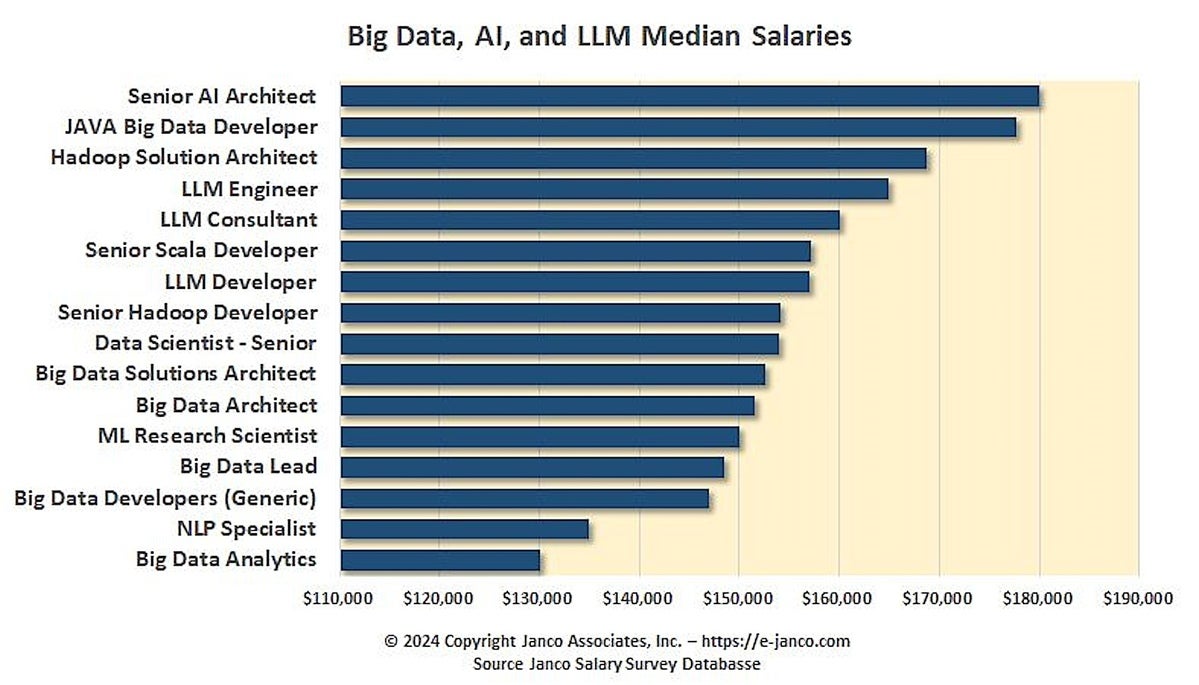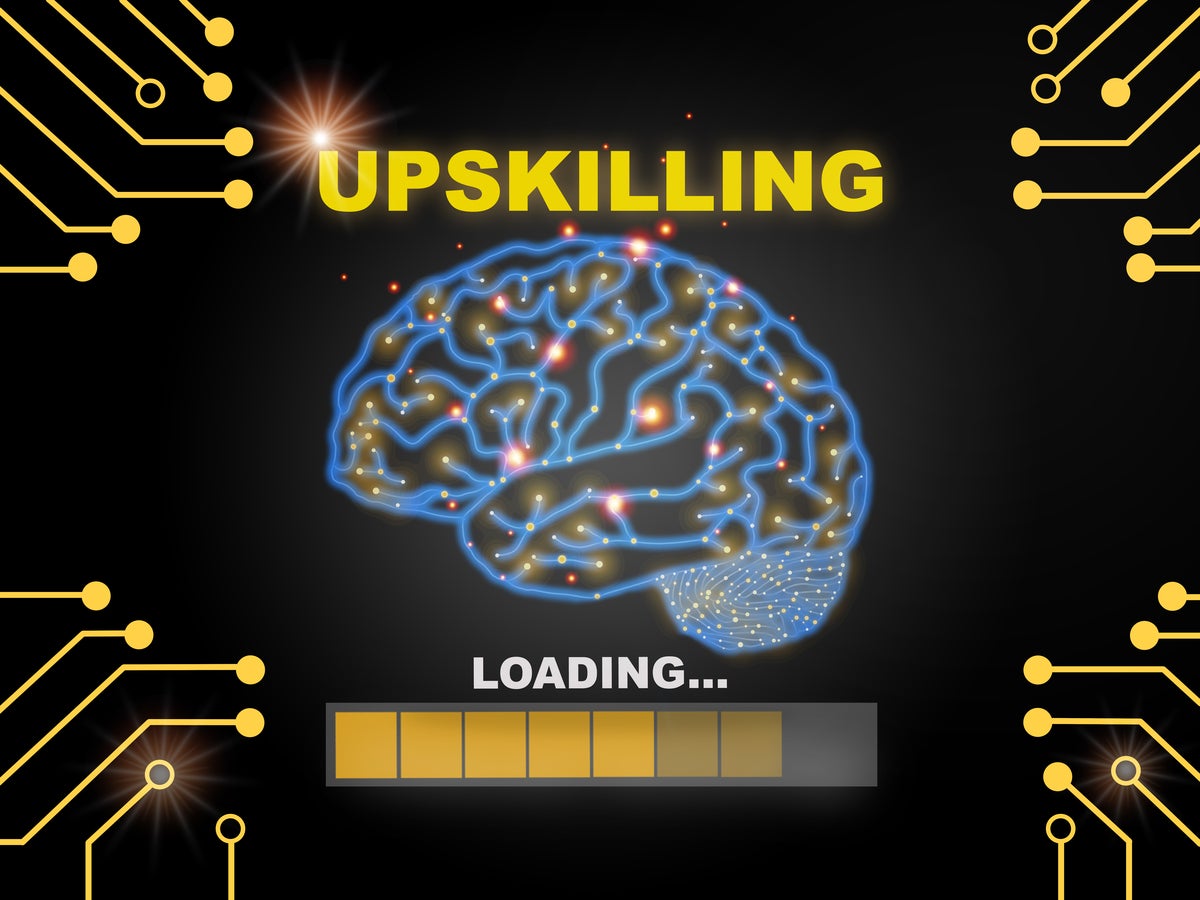The top 10 highest paid skills in tech can help workers earn up to 47% more — and the top skill among them is generative artificial intelligence (genAI), according to a new report from employment website Indeed and other sources.
For example, the top three skills — genAI, system-on-a-chip (SoC) and deep learning — each command an annual salary north of $170,000.
This year, the median salary for IT skilled workers is $101,323, according to IT business consultancy Janco Associates.
Half of the highest-paid skills in tech are AI-specific, which suggests that job seekers with AI talent can stand out in a competitive job market and earn more than their counterparts, according to Indeed.
“One thing everyone can agree on is that the tech industry is changing, and likely irrevocably,” according to Indeed’s report, which is aimed at helping tech workers be more competitive and/or find a new job in 2024.
Job seekers need to keep up with the tech industry’s new demands, which include changes stemming from the widespread adoption of genAI tools over the past year. While genAI will touch virtually every industry, tech will be affected the most.
“In today’s workplace, tech workers (and really, most workers) need to be adaptable as AI continues to impact the world of work,” said Donal McMahon, Indeed’s vice president of data science. “Generative AI in particular is where we are seeing an uptick in shared interest from both job seekers and employers.”
Enterprises spent about $19.4 billion worldwide on genAI technologies in 2023; that amount is expected to double this year, according to research by IDC.
“The way I often describe this is AI is sucking the air out of almost all non-AI investments in the whole tech world,” said Harvard Business School Professor David Yoffie.
Layoffs don’t lie
The past year has seen a trend of “rolling layoffs” that, despite better economic numbers, have continued to plague IT jobs. Business Insider likened the leveling out of IT layoffs to those you might see in any other big industry settling into a more sustainable rhythm.
In January, US-based employers announced 82,307 cuts, compared to 34,817 cuts the month before; it represented a 136% increase in layoffs over December and a 10-month high, according to a report by outplacement firm Challenger, Gray and Christmas. The surge in job cuts was led by the tech industry.
While that January number is down 20% from the 102,943 cuts announced in January 2023, they’re a sign the tech job market is shifting, the outplacement firm said.
 Janco Associates
Janco AssociatesThe International Monetary Fund (IMF), in a report issued in January, noted that shift, saying the world is on “the brink of a technological revolution that could jump start productivity, boost global growth and raise incomes around the world.” Yet AI and genAI could also “replace jobs and deepen inequality.”
The IMF found the results of an analysis of AI and jobs to be “striking,” and said nearly 40% of global employment will be exposed to the effects of genAI. That figure could be even higher — 60% — in advanced economies such as the US and Europe.
Indeed’s McMahon said data backs that up: “Searches for generative AI jobs on Indeed have surged nearly 4,000% in the last year, indicating a pronounced industry shift. Job postings for generative AI roles have seen a remarkable 306% increase since September 2022, underlining the sustained demand for these specialized skills.”
David Foote, chief analyst at IT research firm Foote Partners, said fast-evolving technologies like AI “are forcing organizations to move more quickly in filling specific gaps in their job architectures.”
Foote Partners publishes a quarterly analysis of supply and demand for 1,333 IT skills and certifications at 4,314 U.S. and Canadian organizations. During the last three months of 2023, many non-certified IT skills were among those earning the highest pay premiums, including AI, big data analytics, and identity access management (including machine learning)
According to Foote Partners, the top jobs within the genAI family are:
- Lead Artificial Intelligence Engineer
- Principal Artificial Intelligence Engineer
- Senior Artificial Intelligence Engineer
- Artificial Intelligence Engineer
- Lead AI Data Analyst
- Senior AI Data Analyst
- AI Data Analyst
- AI Product Manager
- AI Prompt Engineer
- Human AI Collaboration Manager
For example, AI engineering is central to product innovation because it leverages AI, machine learning (ML) and software engineering skills to transform ideas into reality and develop a wide range of products and technology for commercial use.
“This group takes the lead in bringing projects to production, but also [has] the opportunity to come up with new ideas,” Foote’s report said.
The rise of skills like prompt engineering
Within the genAI field, both fundamental software development and prompt engineering skills are highly sought after by organizations for creating foundation AI models, tuning them for domain-specific applications, and building consumer-facing products, according to McMahon.
“Prompt engineering is a more accessible job skill for those without a software engineering background. After training up prompt engineering, individuals are able to quickly leverage large language models in a variety of industry tasks such as content creation and text summarization,” he said.
Other top worker capabilities related to AI being sought by employers include data science, machine learning engineering, and software engineering.
Indeed said it’s seeing “a high repetition of the skills identified on its list. Specifically, we see data scientists and machine learning engineers focusing on: generative AI, Deep Learning, Torch, PyTorch and computer vision,” McMahon said. “The capabilities for software engineers are slightly different, with companies preferring skills such as SoC, PyTorch, Computer Vision, Mesos, Rust and Elixir.”
Top 5 highest paid skills, according to Indeed:
- Generative AI
- Avg. Salary Potential: $174,727
- % difference (with skill vs without): 47%
- Avg. Salary Potential: $174,564
- % difference (with skill vs without): 47%
- Avg. Salary Potential: $170,939
- % difference (with skill vs without): 44%
- Avg. Salary Potential: $169,874
- % difference (with skill vs without): 43%
- Avg. Salary Potential: $168,636
- % difference (with skill vs without): 42%
The top jobs seeking those skills include data scientist, machine learning engineer and software engineer, and the top companies hiring for those skills include Deloitte, Ericsson-Worldwide, and Meta.
While many of the “skills” identified by Indeed simply look like the technologies themselves, such as “SoC” or system-on-chip, the “skill” is being listed across various job descriptions and in top employers hiring.
The specific technical skills related to those technologies include: Analog IP integration, PCIe High-Speed Interfaces, SoC-Level Clocking, Reset, and Power Management, FPGA Design Experience, and RTL Synthesis and DFT/MBIST Insertion.
Where to learn new skills
Indeed’s recent Workforce Insights Report found that 43% of 5,000 job seekers feel a lack of certifications is one the top barriers to finding jobs they want, but a majority of those certifications can be accessed through online learning. The report also found that 71% of workers are open to new opportunities and 60% are prepared to apply.
There are a variety of effective methods for learning new tech skills, including not only enrolling in online courses, but attending boot camps and participating in other training programs tailored to AI development and other top skills.
The top online IT certification providers are: CareerFoundry, Coursera, Udemy, EdX, Codefinity, Codeacademy, Udacity, and FutureLearn. Many universities and colleges offer online certification courses. Beyond that, there a variety of free or cheap online courses, including:
“These resources provide practical experience and can accommodate busy schedules. Continuous learning and staying abreast of the latest advancements in AI are essential for success in this rapidly evolving field,” McMahon said. “For many roles today, it’s important to invest in building tech literacy. Everyone in tech can benefit in learning about the basics of AI, as nearly every tech role now has to be an AI role.”
Copyright © 2024 IDG Communications, Inc.
This story originally appeared on Computerworld

